
Pseudorasbora parva grows relatively fast. Generally speaking, after a few months of breeding, it can enter the age of sexual maturity and has the ability to reproduce. In the right breeding season, they can breed. Generally speaking, the most suitable breeding month is from April to June, but there will also be topmouth gudgeon breeding in other months, which occurs more in July. Of course, their reproduction mainly depends on whether the surrounding environment is suitable. Water quality and feeding are two important factors to ensure that the water is clean and regularly fed to provide nutrition for them.
After sexual maturity, Pseudorasbora parva can reproduce. Pseudorasbora parva belongs to a kind of viviparous fish, that is, they can directly give birth to small fish, the process of reproduction does not go through the two steps of spawning and hatching. In the process of production, it is necessary to ensure that the water quality and temperature are appropriate, and to provide adequate nutrition, so that they can be produced smoothly. After the birth, they will consume more energy, at this time need a period of time to let them rest, after the recovery of energy before the next birth. Generally speaking, they can only reproduce twice a year, and no more. After they have given birth, what the breeders need to do is to provide them with a suitable environment for them to recuperate. Specifically, water quality is very important, and water needs to be changed every five days or so, each time changing about one fifth of the total water volume. Feeding is also very important. You can match some feed, such as oil bran and so on. You need to feed twice a day, and you can feed more in the evening.